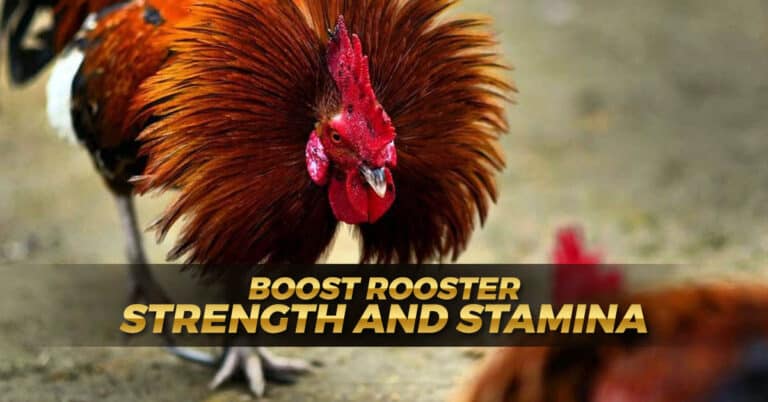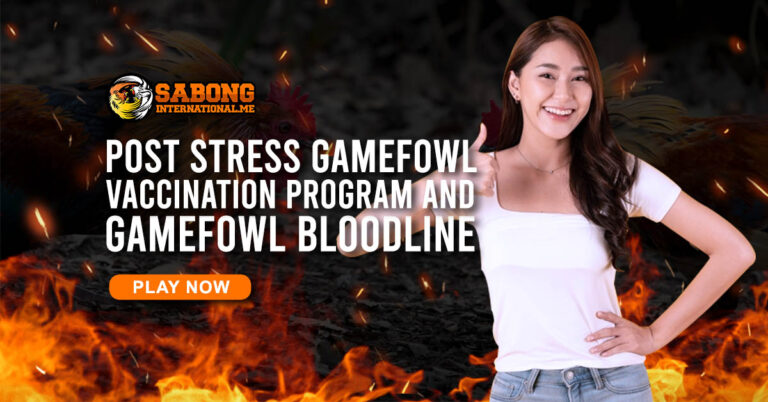What are the things that make Gamefowl stressed & How to Treat it
Sabong International gives the finest things you can do to keep your flock healthy and productive: reduce or restrict stress. Similar to how stress affects people, it can cause a variety of issues in poultry, such as decreased egg production, sluggish growth and development, and increased susceptibility to disease.
The Chicken Health Handbook author Gail Damerow claims that chicks are constantly under some sort of stress. Instead of trying to completely eradicate stress, our goal should be to contain and lessen it.

Obvious Causes of Gamefowl Stress
Poor performance, disease, and even death are just a few of the issues that stress can cause. Understanding the various forms of stress and how to handle them is crucial for ensuring that your gamefowl stays healthy and performs at its peak.
Water Issues
Water shortages might lead to unneeded tension. Stress can also be brought on by water of poor quality. Give them a constant supply of pure, fresh water, and clean their watering apparatus frequently to lessen stress. See our post on the value of water to hens for additional details.
Inadequate Dietary Intake
Feeds for chickens are created for certain uses and age ranges. Inadequate nutrition, a lack of feed, or allowing feed decay can all result from feeding the incorrect kind of feed. For instance, young chicks should not be fed a lower protein diet meant for mature birds, such as layer ration, but rather a chick starter that provides necessary levels of protein.
Handling that is Excessive or Rough
They experience some stress when handled, especially when handled roughly. Stress can be greatly increased by kids who haven’t been adequately taught how to handle birds. On the other hand, caring for your birds properly can lessen stress in general. If you handle your hens infrequently, they will not be accustomed to human contact, which will cause them undue stress when you do handle them (for example, to check for mites).
Handling them gently and frequently enough for them to get used to it is the solution but in moderation. Simply spending a few minutes each day with them in the coop or pen can help. They will learn that you are not going to harm them if you pick up a hen or rooster, hold it for a bit, and then gently set it down. Some gamefowl breed more so than others, and they will be less anxious when you do have to handle them as a result of regular handling.
Fear of Predators or Dogs
If your hens are being endangered by predators or if dogs are permitted to roam freely within the coop, this could stress them out. Consider installing some kind of perimeter fencing around the coop to keep creatures like this out.
Overcrowding
Too many chickens crammed into a tiny area causes stress, exacerbates pecking behaviors, makes maintaining basic hygiene more challenging, and can raise the danger of parasites and disease. Make sure your chickens have enough room to roam.

Illness and Parasites
Stress from illnesses, internal parasites like worms, and external parasites like mites weaken chickens’ immune systems and make them more vulnerable to illness.
Temperature Extremes
One of the most frequently discussed forms of stress for hens is heat stress, along with extreme cold. What feels cold to us may not necessarily be cold to chickens because they are often much better insulated than we are.
Spending time with your chickens and observing their behavior and living conditions is one of the best methods to spot stressors and other issues. You’ll be able to detect unhealthy ammonia buildup that can occur as a result of insufficient ventilation and rapidly identify unclean living conditions.
Beyond that, hens’ behavior will alter in response to increased stress. You will be better able to discern when someone’s conduct is beginning to alter due to stress if you spend enough time with them and observe them to become familiar with their typical behavior. The flock will become happier, healthier, and more productive if you promptly identify the issue and implement changes to address it.
Proper Treatment of a Stress-Free Gamefowl
The ability of a chicken to tolerate bad water and endure it is exceptional. We’ve all witnessed dirty water containers and yardbirds drinking from puddles of stagnant water, yet the hens appeared to be in good health. What isn’t obvious is that the chicken’s immune system is continually fending off not only the bacteria in the water but also all the others in the air, the soil, wild bird droppings, etc.
The bird’s inherent resistance to sickness may be weakened as a result of this “stressor.” Simply change the water frequently and make sure it’s clean to help avoid this and to take away one “route of exposure.” The chicken will be able to use this extra energy to fight off other potentially dangerous germs and viruses as well as to build strong and flexible feathers, muscles, and body systems that will be crucial in the pit and the brood pen.
Make Your Environment Healthy
It is crucial to have access to clean water and air. Because they lack sweat glands, chickens are susceptible to heat exhaustion, especially in poorly ventilated environments. Make sure each chicken travel crate has breathing openings and select a vehicle that permits airflow during transportation.

When chickens sense airflow, they become more at ease and relaxed. It is comparable to people taking in a nice summer breeze. To be safe, avoid selecting a transport vehicle that is exposed to the weather. Chickens cannot be protected in open-air vehicles from possible precipitation, snow, road debris, or strong winds.
Additionally, chickens require access to clean water every two hours to avoid dehydration and stress. The flock must be fed four times a day on long journeys as well.
Try to make sure your chickens have the least amount of disruption possible while still getting the air, water, and food they require.
When transporting gamefowls, use small, dark boxes.
You should restrict your chickens’ access to light while allowing them to feel a gentle breeze. Reduce stress by placing small, dark crates around. Make sure the air openings aren’t too big to allow a lot of light to enter. In the dark, chickens enter a trance-like state that keeps them calm. The more opaque your boxes can be while maintaining an abundance of fresh airflow, the better.
The best approach to transport your flock is by using little boxes that can fit two or three hens. While being transported, the hens won’t be able to move because of the close quarters, and the other chickens will keep them calm.
Smooth, Quiet Travel
Avoid taking routes with a lot of construction, loud traffic, or uneven roads. Stress in your poultry will be less likely to occur if you travel in calm, peaceful conditions.

Before you start moving chickens, lower the noise level they will experience by setting crates on sound-absorbing materials like blankets or rubber mats. Another smart move is to think about driving an insulated vehicle.
Convenient Housing
The following requirements must be met at the new housing facility before you move your flock there:
When your chickens arrive at their new site, you want the surroundings to feel normal and for them to be as content as possible. Before moving your chickens, take the time to make sure everything is prepared for the finest outcomes.
These four methods can help you significantly reduce the likelihood that your chickens will experience gamefowl stress. It is advisable to create a gamefowl stress management program and take preventative steps before transporting your flocks. Allowing chickens to reach their ideal health, can aid in delaying the early start of gamefowl stress.
How a gamefowl stress-reduction program aids:
When hens are under stress, their bodies deplete their nutrient reserves to reestablish a normal physiological equilibrium. When those reserves are exhausted, the gamefowl stress can be fatal. The body’s stocks of the following five crucial nutrients are replenished by a stress management program using non-medicated nutritional supplements:
By employing a stress management strategy, you may assist your chickens in not only surviving any possible stress brought on by transportation but also increasing their health and productivity.
Conclusion
Gamefowl stress is a serious issue that can affect the health and performance of gamefowl. It is essential to understand the different types of gamefowl stress, their causes, and how to manage and prevent them. By providing a healthy and balanced environment for gamefowl, breeders, and enthusiasts can ensure that their birds live a happy and fulfilling lives.










